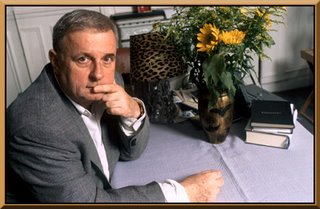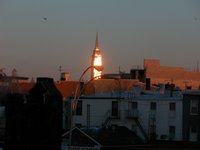 I think I'm going to start a series on the unbelievable rudeness of people who work in places in this city in which they have absolutely no chance of earning a tip. Unless there's the possibility that, by talking to you nicely, they'll earn themselves another dollar on top of the apparently-optional-but-actually-mandatory tip they expect no matter what kind of service they provide, you're better off not dealing with most New Yorkers. This evening's specimen: the brattish shop clerk in the wonderful Strand Bookstore, where I'd gone to stock up on Richard Ford and to spy out a present for A. This evening was the first really gloriously summery evening in Manhattan, and I had worked a full day at The Literary Journal, and I was in something like a good mood for the first time in three weeks. The green market was open again in Union Square, and lovely smells of fruit and flowers were in the air, and people were in their summer gear... it was just pleasant. And to make it even more pleasant, I headed to Strand. But I couldn't locate the anthologies (I wanted to get a copy of Ford's Book of the American Short Story ). I could find the novels, and the literary theory, and the poetry and the drama and the art books and the Americana, everything where it usually is, on the towering, well-organised shelves with their handwritten signs, but I'd never had to look for an anthology before and I needed help. So what did I do? I approached a member of staff. A young guy stocking a shelf in the fiction section. The exchange went pretty much exactly as follows:
I think I'm going to start a series on the unbelievable rudeness of people who work in places in this city in which they have absolutely no chance of earning a tip. Unless there's the possibility that, by talking to you nicely, they'll earn themselves another dollar on top of the apparently-optional-but-actually-mandatory tip they expect no matter what kind of service they provide, you're better off not dealing with most New Yorkers. This evening's specimen: the brattish shop clerk in the wonderful Strand Bookstore, where I'd gone to stock up on Richard Ford and to spy out a present for A. This evening was the first really gloriously summery evening in Manhattan, and I had worked a full day at The Literary Journal, and I was in something like a good mood for the first time in three weeks. The green market was open again in Union Square, and lovely smells of fruit and flowers were in the air, and people were in their summer gear... it was just pleasant. And to make it even more pleasant, I headed to Strand. But I couldn't locate the anthologies (I wanted to get a copy of Ford's Book of the American Short Story ). I could find the novels, and the literary theory, and the poetry and the drama and the art books and the Americana, everything where it usually is, on the towering, well-organised shelves with their handwritten signs, but I'd never had to look for an anthology before and I needed help. So what did I do? I approached a member of staff. A young guy stocking a shelf in the fiction section. The exchange went pretty much exactly as follows:
Me: Excuse me, could you tell me where the fiction anthologies are kept?
Shopguy: I don't know what an anthology is, so you should...
Me: It's like where you get a load of writers in one book, a selection of different pieces by different authors....it's fiction, so you should have it around here somewhere...
Shopguy (face has darkened somewhere in the middle of my last sentence, now looking at me like he would like to hurt me, and now speaking in as sarcastic a tone as his little Lacoste-clad ass can muster): Oh. Well, actually, see, I don't know what a writer is either.
Me: Oh. I see. You're...
Shopguy: Go and ask someone else.
Me: Just forget it.
I walked off and asked someone else, roughly two feet away, and they politely directed me to where the anthologies were. I walked in that direction accompanied by the sound of Shopguy's pointing and sneering along with the colleague who had joined him to relish this incredibly interesting and bizarre display of obvious lunacy by a customer with a weird accent.
This made me REALLY MAD, as rudeness in a situation like this always does. I mean, what would it have cost him just not to have been such a blatant prick? Sorry. Anyway, I should have stormed out, called his manager, etc, but it wouldn't have made any difference (no, really, I don't think it would) and being able to browse in Strand is more important to me than scoring a point over somebody who got the equivalent of a 2.1 in English Lit last year and will be working in Strand until they start to get jowelly under the chin...so I just kept looking, and eventually found the Ford in hardback for $14, and Women With Men , (which I last read during the summer of 1999, when I spent four months writing 100 fake horoscopes a day in a plastics factory in Drumcondra) for a fiver. Plus a copy of the new book of Henri-Cartier Bresson's Portraits for A, to celebrate lots of things, including an anniversary (ours, number four), a fellowship (his, for full tuition, for the next year of his PhD), and a publishing deal (his, for the book of essays he's co-editing, with a very good Irish publishing house). The book is brilliant and beautiful (aptly) and I will try to post some scans of the amazing portraits of people like Beckett (on the cover, and his birthday is the same day as our anniversary, so that was apt also), Beauvoir, Sontag, Capote, Matisse, Bacon, Jung, Camus, Miller, McCullers, Faulkner, Dior....phew.
Wednesday, April 19, 2006
That'll Teach Me to Ask for Anything Other Than Dan Brown
Posted by
hesitant hack
at
9:56 PM
7
comments
![]()
Labels: New York
Coming Soon on E-bay: One Gently-Used Prosthetic Pregnancy Bump
 So it's happened. Finally, a baby with the sufficient mix of squat + stir-crazy to pass as the progeny of Tom Cruise has been delivered by one of the sedated drones at the Scientology compound. But couldn't they have held out for one heavier than a measly 7 pounds? That plastic belly strapped to poor little Joey Potter has looked like at least a 10-pounder since late November...
So it's happened. Finally, a baby with the sufficient mix of squat + stir-crazy to pass as the progeny of Tom Cruise has been delivered by one of the sedated drones at the Scientology compound. But couldn't they have held out for one heavier than a measly 7 pounds? That plastic belly strapped to poor little Joey Potter has looked like at least a 10-pounder since late November...
Pity young Suri. Hope she likes the sound of weeping and gnashing...
Posted by
hesitant hack
at
12:43 PM
5
comments
![]()
Monday, April 17, 2006
Heaney and the Lost Scarf

I'll blog more on this later (I'm crouched in a painfully hipsterish coffee shop at the moment...the broadband in our apartment has been temporarily banjaxed, apparently due to the unfortunate proximity of leaky radiator plus modem...) but I spent the weekend reading, among other things, Seamus Heaney's new collection District and Circle. For now, here's a link to a great personal perspective on Heaney on Shitty First Draft (what a name! and what a misnomer...). SFD links to Marie-Louise Muir's account of her meeting with Heaney a fortnight ago.Iit was for Muir, as well as a chance to discuss the new collection, a marker of the 40th anniversary of Death of a Naturalist. The article is published in the Belfast Telegraph
Often the stories behind interviews with writers come across just as interestingly as, or indeed more interestingly than, the interviews themselves. I don't know if this is true in this case, but I'll soon find out: SFD's encounter with Heaney will be broadcast on BBC Radio Ulster's Arts Extra this evening, Monday, April 17 at 6.05pm.
Posted by
hesitant hack
at
9:51 AM
9
comments
![]()
Friday, April 14, 2006
Nine Lives

A couple of evenings ago, I went with a friend to hear Edmund White in a public interview at the New York Public Library. By all accounts, White was on the nervous side before the event, partly because his interrogator, Paul Holdengräber, is known for his slightly bizarre and extremely needly style of interviewing.
Holdengräber is the new director of Public Programming at the NYPL, brought in to try and rescue the library's series of talks and readings from oblivion and to seduce a younger, more fashionable crowd. Not, you understand, that he's particularly young or fashionable himself - he's simply noisy. On the evidence of what I heard the other night, he sets out to unsettle and to undermine his interview subjects until they bend helplessly and entirely to his bidding - which seems to be to make himself look as clever, as well-read, as impressively-connected and as dashingly witty as possible. The guy is quite a piece of work. I didn't attend his last interview, with the pianist Alfred Brendel, but apparently he chose to begin by asking Brendel for his favourite joke, and when Brendel was a bit stumped (understandably, given that he, not to mention the audience, expected a discussion of his interpretations of Beethoven, Mozart, etc, over the course of the last 55 years), Holdengräber jumped straight in and spent several minutes regaling everyone present with his own favourite joke. Which I don't remember being told, but I'm sure it included references to Sartre and Camus and how very much they enjoyed Holdengräber's company. (continued...)
Oh, I shouldn't rant. Edmund White was more than able for his interviewer's bad behaviour the other night. In fact, he met it with such honesty and charm that the event proved a much better showcase for White's best qualities as a writer and as a speaker than Holdengräber must have intended. Because, from the beginning, Holdengräber was on the attack. The subject was White's most recent book My Lives, a memoir exploring his experience as a gay man in modern America. In her reviewof the book in the NYT Book Review last weekend, Laura Miller points out that the subjects with which White decides notto address in My Livesare arguably more interesting than those with which he doea deal. For example, there is hardly any mention of his lover who died of AIDS in the mid-90s, or of his own HIV diagnosis in 1985 (he has remained healthy since then, and only began to take HIV medication last summer), or of his role as a founder of the Gay Men's Health Crisis, or his writing about homosexuality, or his (nonmonogamous) relationship of the past 10 years. White's reasons for obtuseness on these counts are certainly to be wondered about - which is precisely the opportunity afforded by a public interview. That, and the opportunity to ask the author to talk, in his inimitable way, about the subjects on which the book itself might disappoint. When the chance finally came for audience members to take the floor, such questions were put to White - but Holdengräber had taken up so much of the assigned time with his excruciating combination of preening and prurience that there were only a few minutes for this more interesting discussion.
Holdengräber was fuelled, in his question, by a barely-disguised fascination with the explicit passages in White's book - that is, those passages in which he leaves no part of his sex life to the imagination - and beneath that fascination could be sensed, in turn, a poorly-controlled sense of fear or repulsion on Holdengräber's part. Throughout, he acted as though he felt supremely justified in trying to make White feel as uncomfortable, as embarrassed, perhaps even as ashamed, as possible where the contents of his own book were concerned. He constantly alluded to how shocked and how "educated" he was by White's descriptions of gay sex. He barked at him to read passages, and when they turned out not to be sufficiently scandalous passages, he barked at him to find others. White, for a time, looked like a schoolboy being chastised in the office of the principal. It was hard not to sense an undertone, in Holdengräber's line of questioning, which went something like this: What were you thinking, actually admitting to this stuff, you filthy old queer? And of course, there were the inevitable assertions of his own heterosexuality, delivered at intervals between his name-dropping of intellectual acquaintances and his pointless forays into French. He looked, onstage, like a young John McEnroe in the midst of a tantrum so violent that it deluded him into believing he was, in fact, the dead French philosopher Maurice Merleau-Ponty.
Anyway, White was a hugely enjoyable speaker, when he managed to get a word in edgeways. He talked about his sister, who had a very difficult coming out after years of life as a wife and a mother of three, and about knowing Foucault towards the end of his life (this wasn't name-droppy at all, but it sent the interviewer off into a frenzy of talk about the french intellectuals he knew...see above). He talked about how Foucault had no idea that he was dying of AIDS until about three months before his death in 1984. He talked also about the reasons why he (White) doesn't keep any sort of journal (a combination, he said, of sheer laziness and of a belief that some degree of forgetting is necessary to the craft of fiction). He talked about why he didn't write about some people, about some losses; once you write things, he said, you lose them, in a way. Emotion can lose its immediacy, become blunted or, worse, polished. So he resists writing about some things, and maybe never puts them into print. It was very interesting. And when he talked about his own experience of being diagnosed with HIV in the 1980s, he was both moving and hilarious. Every arts-related television and radio programme in Europe and America had him on as "the dying author" Edmund White, and he had to face constant blunt questions of the "what does it feel like to have months to live?" variety. In the fact that some of the people who asked those questions are now themselves dead, while White is still in rude good health despite being positive, there was a rich irony, but he didn't exploit it. Despite the bombast of his writing, he's too good-natured for that. If you ever get the chance to see him in person, grab it. Regardless of how you feel about his writing (I find it generally very good - he's currently at work on a novel about Stephen Crane and his infatuation with male prostitutes), the man himself won't disappoint.
Posted by
hesitant hack
at
1:26 PM
1 comments
![]()
Thursday, April 13, 2006
Birth was the death of him
 "I was born on Friday the thirteenth, and Good Friday, too. My father had been waiting all day for my arrival. At eight p.m. he went out for a walk, and when he returned, I had been born."
"I was born on Friday the thirteenth, and Good Friday, too. My father had been waiting all day for my arrival. At eight p.m. he went out for a walk, and when he returned, I had been born."
Samuel Beckett, letter to George Reavey, 1972.
*
"He was a pale, sickly baby, long and thin, crying constantly, decidedly different from his robust and placid older brother. He gave his family some concern during his first weeks of life, but was never in any serious danger."
Deirdre Bair, Beckett, 1978
*
"There has been a lot of debate as to whether this was or was not the true date of his birth. His birth certificate records the date as the thirteenth of May, not April. And his father registered the event on June 14 - a month later, it is argued, than he would, or at least should, have done, if the birth had been in April. So it has been claimed that Beckett deliberately created the myth that he was born on Friday the thirteenth - and a Good Friday at that; a fitting date for someone so conscious of the Easter story and so aware of life as a painful Passion.
[...]
More interesting, and far more revealing, is how Beckett spoke about his birth. He claimed to have clear prenatal memories of life within his mother's womb. The womb is commonly thought of as a sheltered haven, where the fetus is protected from harm. Occasionally, that is how it is reflected in Beckett's writing; in the poem 'Sanies I', for instance, which looks back to his birth, he writes nostalgically, "ah to be back in the caul now with no trusts / no fingers no spoilt love." Yet the memories that, as an adult, he claimed to have of the womb, deriving probably from the period shortly before birth, were associated more often with feelings of being trapped and unable to escape, imprisoned and in pain."
James Knowlson, Damned to Fame: The Life of Samuel Beckett, 1996.
Posted by
hesitant hack
at
7:48 AM
0
comments
![]()
Labels: theatre
Wednesday, April 12, 2006
Birthday Boys
 Today is the birthday of two of my favourite people in the world, who also happen to be the very favourite people of one another. Does that make any sense at all? It is my convoluted way of saying that they are in lurve, and a lovelier, funnier, feistier couple you could not meet (apart, perhaps, from the gentlemen in the photograph, who are not actually of my acquaintance. Yet.)
Today is the birthday of two of my favourite people in the world, who also happen to be the very favourite people of one another. Does that make any sense at all? It is my convoluted way of saying that they are in lurve, and a lovelier, funnier, feistier couple you could not meet (apart, perhaps, from the gentlemen in the photograph, who are not actually of my acquaintance. Yet.)
But what to offer in the way of a birthday post for my friends? I have some very charming photographs of them beating each other up (affectionately, of course) on a clifftop in West Cork on an afternoon of gale force winds last May, but in the interests of anonymity (and given that one of them is known, in blogworld, only as Anonymous), I will keep those to myself for now. But it doesn't seem enough to post a crappy teddy-bears-plus-birthday-cake picture, either. So I have tried to reflect the interests, preoccupations and passions of both my great friends in the accompanying illustrations (below). I hope they complement the profund reflections on companionship and mortality in which you will no doubt be deeply absorbed today...


Happy Birthday, Miglior and Anonymous!!
And while I'm at it, Happy Birthday, Miglior's twin brother. Who is not, just to clarify, Anonymous. Well, he may be another Anonymous. But not this one. At least I hope not. Plus, he is unlikely to have any interest in Ian Thorpe, beyond observing that the boy can swim very quickly indeed and that he would be of great addition on a building site. As I'm sure Miglior and Anon would agree...
Posted by
hesitant hack
at
10:29 AM
4
comments
![]()
Tuesday, April 11, 2006
by popular demand...
In response to the tens of thousands of requests I have received (ok, just one), commenting by non-bloggers is now enabled. So...don't be a lurker. I can see you...
Posted by
hesitant hack
at
3:26 PM
0
comments
![]()
Monday, April 10, 2006
Accentuate the Positive
Still gloomy, but it's time to move on...back to the stuff of everyday life in this town. There's plenty of it, too...
My voice is forever playing tricks on me. This morning I listened to a tape of an interview I did on Friday, in a Chelsea café, with a New York poet, and I cringed. I could not believe the sound of the vowels that were coming from my mouth. They were all sharp and pingy and perky. Nothing long or soft or flat about them. I sounded like a bloody Yank. It was embarrassing. Truly, deeply embarrassing. It’s bad enough listening to your own voice on tape, but when your own voice is doing a gleeful impression of Jennifer Aniston, entirely without your permission, it’s a hell of a lot worse. I skipped over half of the tape (and while I was doing that, I asked myself, why do I talk so much in interviews, anyway? I’m not the one with a book or a play or a line of ridiculously expensive shoes to promote. Put a sock in it next time, I tell myself. But I never learn).
My accent is even more confused than ever at the moment, veering at it has done, in the past week, between Brooklyn and Birmingham and the back lanes of rural Ireland. We were in Ireland last weekend, for a sad occasion (but it was lovely to be able to be there), and as always when I’m down home the thickness of tongue in which I first learned to speak comes back as if I’d never siphoned it away during those freshman seminars in Trinity. Then when I returned to NY, it was straight into the final rehearsals for Ecstasy, and then the performances, which had me storming around the stage for three nights with an accent brazen enough to give Kat Slater a run for her money (wrong city, I know). My character, Dawn, was a blabbermouth and a screechy drunk, “teeth-sucking and spread-eagled” as one of my classmates who came to the show described her, and while I had a huge amount of fun playing her, I’m glad to bid her farewell. I have genuinely never done anything as exhausting in my whole life, and I have renewed respect for actors who do this for a living and not just for a sort of experiment, as I did; the physical and emotional tension in which your body and mind are locked every second of being onstage – which in my case amounted to almost 3 hours a night – is incredible, and left me sore in bones I didn’t even know I had. I can’t imagine doing it for a 3 week run. And I can’t imagine moving between parts, or having more than one part on the go at once, as I know many actors do – Dawn still won’t leave me be, and I keep slipping into her trashy tones every so often, denouncing the world and its mother in 1970s Brummie slang. But you know what, if it keeps me from Manhattanisms, from the rash of likes and ohmigods that have been crawling over my vocabulary with worrying tenacity in the last few months, then I’m happy, I am. Ooh ah.
Posted by
hesitant hack
at
11:23 PM
2
comments
![]()
